Meditation – also known as Mindfulness
What is Meditation?
[Related Questions: What is the definition and meaning of meditation? What meditation is all about?]
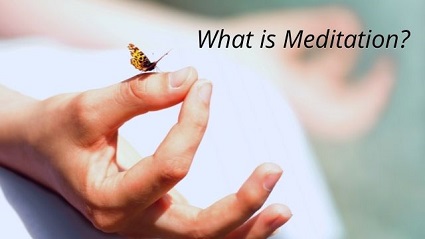 Meditation is a methodical practice used to clear the mind, relax the body, and clarify spiritual awareness. Sometimes referred to as “Mindfulness,” meditation typically involves assuming a comfortable and stable body posture for while releasing the mind from thought, usually by focusing on sensory input like measured breathing or a spoken mantra.
Meditation is a methodical practice used to clear the mind, relax the body, and clarify spiritual awareness. Sometimes referred to as “Mindfulness,” meditation typically involves assuming a comfortable and stable body posture for while releasing the mind from thought, usually by focusing on sensory input like measured breathing or a spoken mantra.
There are many variations on the practice of meditation depending on cultural context and individual intention.
Meditation may be practiced in groups (in person or remotely) to focus collective spiritual energy on a shared intention.
What is the purpose of Meditation?
[Related Questions: Why learn to meditate? What is Meditation all about? Is Meditation good for mental health? Should I learn to meditate? Why is it good to meditate?]
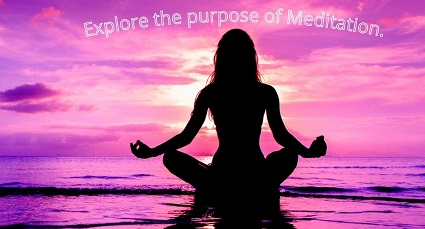 People usually meditate to achieve a sense of well-being on physical, emotional, and spiritual levels. Meditative techniques release conscious awareness from physical and mental bonds and enable association with the metaphysical realm. The purpose of this transcendent experience is to achieve peace of mind, spiritual guidance, emotional calm, improved health or healing of specific emotional or health issues, and increased energy.
People usually meditate to achieve a sense of well-being on physical, emotional, and spiritual levels. Meditative techniques release conscious awareness from physical and mental bonds and enable association with the metaphysical realm. The purpose of this transcendent experience is to achieve peace of mind, spiritual guidance, emotional calm, improved health or healing of specific emotional or health issues, and increased energy.
Meditation may be practiced in groups (in person or remotely) to focus collective spiritual energy on a shared intention.
What are the types of Meditation?
[Related Questions: What exactly does meditation do? Which Type of Meditation Is Right for Me? How does meditation work? What are everyday ways to practice meditation? What is the best way to meditate?]
There are too many variations of meditation to list, but they can be grouped into broad categories, such as:
- Focused attention Mediation on a chant (such as OM), controlled breathing pattern, object (such as a flame), or a sensory experience (such as incense or ocean waves). While typically represented by a person seating in a lotus (Yoga) position, the meditation may be conducted from a relaxed sitting or reclined posture.
- Controlled activity Meditation is incorporated in specific disciplines such as Yoga or Tai Chi but can even be applied to a simple walking routine. The meditation is based on the controlled practice and awareness of specific movements.
- Guided Meditation is directed with sensory input from another source, which may be live or recording, audio, video, or remote.
- Mindfulness Meditation involves creating a feeling of loving/kindness for yourself, and then extending it to others in and beyond your personal sphere. Mindfulness may also bring deep loving attention to activities in your daily life, such as cooking or gardening.
- Body Scan Meditation rids you of stress that is always manifested physically in some way. Systematically breathing into and exhaling tension from each part of your body will ensure total body and mind relaxation.
Meditations can be performed individually and in groups of any type and size. Consult with a mediation practitioner to explore which options are available and would work well for you.
How do I Meditate?
[Related Questions: How is meditation done? Can anyone learn to meditate? How can I learn to Meditate at home? What does meditation do? What is a step-by-step guide hot to Meditate?]
The basic beginner practice of self-directed, focused meditation is quite simple. Follow these steps for a 10-minute session:
- Determine the focus you will use for your attention. You may want to speak a mantra (such as “Om”), or you may want to focus on slowly breathing in and out. The specific mechanism does not matter as much as keeping your attention focused.
- Find a comfortable and quiet place to sit. Close your eyes.
- Breath in and out slowly. Either focus on your breath or start regularly repeating your mantra for the entire session.
- Notice any drifting of your attention to other thoughts, emotions, or discomfort. After noting these distractions, simply focus again on the mantra or on your breathing.
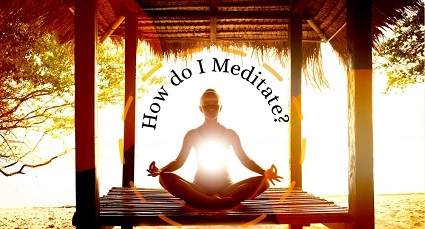 After a few sessions, you are likely to become consciousness of a deeper awareness separate from and observing of your thoughts. This is your spiritual awareness connecting to the metaphysical realm. At the end of a session, your body will be more relaxed and your emotional state more peaceful.
After a few sessions, you are likely to become consciousness of a deeper awareness separate from and observing of your thoughts. This is your spiritual awareness connecting to the metaphysical realm. At the end of a session, your body will be more relaxed and your emotional state more peaceful.
What happens during a Guided Meditation?
[Related Questions: How will I benefit from guided meditation? What is a good or the best guided meditation? Is it okay to use guided meditation? Where can I find guided meditation? Is guided meditation better for beginners? How do I learn to do guided meditation? How will I benefit from guided meditation?]
Professionally guided meditations are useful because they adhere to and reinforce proven methods. Guided mediations may use any of the following techniques, among others: Affirmations (for relaxation, peace of mind, health, abundance, etc.), Body Scans (for health issues and stress), Immersive Sound (Selected music or vibrations associated with brain or Chakra frequencies), Immersive Imagery Video (often with voiceover or music), Progressive Relaxation, Mindfulness, and Self-Hypnosis.
Guided meditations are created for a large variety of purposes such as general relaxation, specific healing, spiritual guidance, life inspiration, and global issues. They can be useful for individual practice and for applying the powerful collective spiritual energy of an in-person or remote group.
A large number of online audio and video meditations are available. There are so many variables in the type and purpose of meditation, however, that it is desirable to collaborate with a credible practitioner to learn proper techniques and select options that are suited to your immediate needs and circumstances.
How do I choose a meditation practice that is right for me?
[Related Questions: What exactly does meditation do? How can I learn to meditate to keep calm? Can anyone learn to meditate? How did you learn to meditate? Where can I learn to meditate? How do beginners learn meditation? What is the best way to meditate?]
Meditation is a very powerful method of bringing transcendent energy into your life, and the process is really a matter of exploration and discovery. An instructor or guide can help you refine your awareness and direct your spiritual energy to greatest effect. You may want to attend a variety of live and remote guided meditation events to experience how they affect you and the depth of your response.
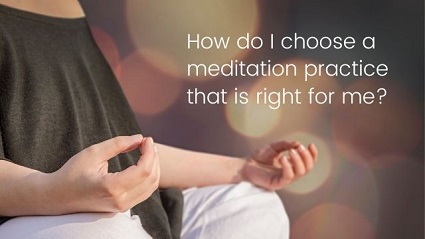 As you explore distinct options, you will recognize which methods dependably create in you a sense of well-being and heighted spiritual energy. Your energy level and health may benefit from local meditation groups or yoga courses. You may find that sound bath meditations that use gongs and crystal bowls tuned to specific chakra frequencies have a strong effect. You may wish to participate in a global online meditation for peace or listen to online music tuned to various chakra frequencies. There is a lot to discover, and many options are available through the Find Magic People platform.
As you explore distinct options, you will recognize which methods dependably create in you a sense of well-being and heighted spiritual energy. Your energy level and health may benefit from local meditation groups or yoga courses. You may find that sound bath meditations that use gongs and crystal bowls tuned to specific chakra frequencies have a strong effect. You may wish to participate in a global online meditation for peace or listen to online music tuned to various chakra frequencies. There is a lot to discover, and many options are available through the Find Magic People platform.
What is the origin or history of Meditation?
Meditation is referenced in Sanskrit texts tracing back over two thousand years and is a core practice in Hinduism, Buddhism, and other Asian spiritual philosophies. In the early 19th century, it was introduced into western culture as both a spiritual and physical discipline along with yoga. In the mid twentieth century Mahatma Gandhi practiced meditation regularly and made it well known. He and other teachers (gurus) of Eastern theologies extended the practice in the western world.
Is there any science behind Meditation?
[Related Questions: Are there any pitfalls of meditation? Can we replace medical treatment with meditation? ]
According to the National Center for Complementary and Integrative Health (NCCIH), one of the US government National Institutes of Health.:
“Many studies have been conducted to look at how meditation may be helpful for a variety of conditions, such as high blood pressure, certain psychological disorders, and pain. Some research suggests that meditation may physically change the brain and body and could potentially help to improve many health problems and promote healthy behaviors.Some research suggests that practicing meditation may reduce blood pressure, symptoms of irritable bowel syndrome, anxiety and depression, and insomnia.
Meditation is considered to be safe for healthy people. However, people with physical limitations may not be able to participate in certain meditative practices involving movement. Don’t use meditation to replace conventional care or as a reason to postpone seeing a health care provider about a medical problem.”
What are the benefits of meditation?
[Related Questions: How does meditation work to promote health? Is Meditation a simple, fast way to reduce stress? How has meditation changed your life? Why is it good to meditate? I have bad anxiety. Does meditation work?]
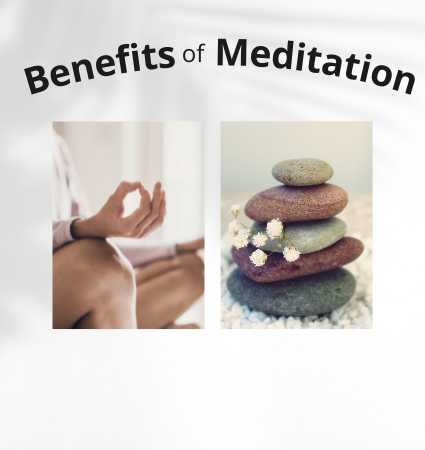 At a basic physical level, meditated relaxation reduces the stress hormones that negatively affect systems throughout the body. At the mental and emotional level, meditation clears the mind of negative thoughts, reduces fears and anxieties, and supports creativity. On the spiritual level, meditation enables awareness and connection to metaphysical realm and provides inspiration and compassion.
At a basic physical level, meditated relaxation reduces the stress hormones that negatively affect systems throughout the body. At the mental and emotional level, meditation clears the mind of negative thoughts, reduces fears and anxieties, and supports creativity. On the spiritual level, meditation enables awareness and connection to metaphysical realm and provides inspiration and compassion.
Regarding specific medical conditions: controlled breathing techniques have proven to lower blood pressure and it’s negative effects; reducing stress improves related conditions such as irritable bowel syndrome, post-traumatic stress disorder and fibromyalgia; focused attention can improve mental clarity and reduce memory loss; systematic relaxation improves ability to fall asleep and sleep well; enhanced spiritual connection can lessen pain, reduce anxiety, fear, depression, and other mental health issues.
In general, Meditation stimulates positive feelings about yourself and others and increases the level lovingkindness in the world.
How long and often should I Meditate?
[Related Questions: What is the best Meditation environment, time length. Is there any prerequisite to Meditation?]
A period of meditation usually will take at least 10 minutes and may last an hour or more. Establishing a meditation routine with a quiet comfortable place and regular time will create a sustained sense of well-being. A daily meditation practice is most beneficial, but 3-4 times a week will ease stress and generally improve health. Meditation may be self-directed or guided by a practitioner or a media presentation.
What are mantras, and how do they work?
[Related Questions: Why are there different mantras?]
A mantra is a spiritual device that helps quiet the mind. When you voice a mantra chant, it generates a sound frequency that has a effect on your brain. According to Yoga practitioners, a mantra is a sound of the sacred or metaphysical realm. Various sounds can create resonance with different aspect of the universal consciousness. The most common, universal vibration mantra is Om (Aum). Others often used for specific outcomes are Shreem (harmony and abundance), Aim (creativity and inspiration), and Om Mani Padme Hum (wisdom and compassion).
Where can I find Meditation instruction or groups?
[Related Questions: Are there meditation practitioners near me?]
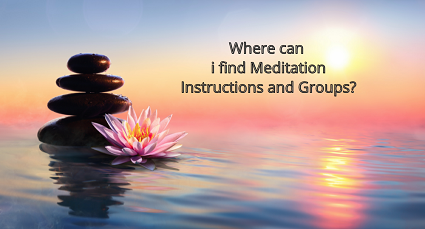 Personal instruction from a practitioner is recommended to learn proper techniques that are suited to your immediate needs and circumstances. You may contact any practitioners on the Find Magic People site for free consultation and information.
Personal instruction from a practitioner is recommended to learn proper techniques that are suited to your immediate needs and circumstances. You may contact any practitioners on the Find Magic People site for free consultation and information.